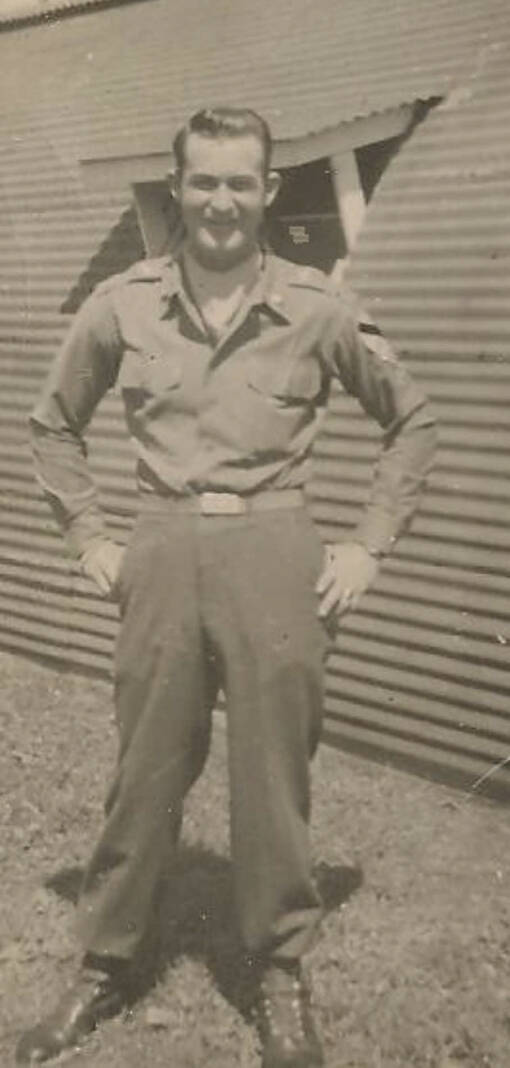
Aubrey C. Woods during the Korean War.
Submitted photo
My dad has been gone for more than 10 years now.
Besides giving me both my first and last names, he — like most dads — taught me a lot about life.
Being one of seven children from a tobacco sharecropper’s family in the Pennyrile region of Kentucky, my dad never had a lot of money and never made it beyond sixth grade. Yet he always worked hard, kept his head down and managed to feed and clothe my mother, me and my two brothers and my sister. I can’t ever remember a time when I was hungry. We may have been poor, but if we were, I sure don’t remember feeling that way.
He liked to work on cars and was what many would call a “backyard mechanic.” I’m sure I learned a lot about what made a car tick and how to get the most of out one from him, especially when it came to replacing a motor or doing a brake job. Dad would help just about anyone in need, especially when it involved a vehicle not working properly.
At his funeral, numerous people said, “Woody never said no when I was having car problems.”
By the way, when I was growing up, no one ever called me Woody, but many of my friends do now, and it’s a nickname I’m proud to share with my dad.
Despite serving in the Army during the Korean War, dad was never a disciplinarian. That’s kind of easy to understand when you consider he went AWOL twice and missed his troop ship from Hokkaido Island in Japan to Korea late in the war. He didn’t hate the military. He just didn’t like all of the rules. Breaking the rules I don’t like or understand was something I also picked up from him.
So he left the discipline to Mom. I can only remember him hitting me once out of anger. Then he found out he had the wrong kid and came back and apologized.
Dad also was a fun-loving man who could play practical jokes with the best of them, but he didn’t always come out on top. I can still remember the time he brought home his pink lunchbox from his job at Link Belt. He left it pink for quite some time before spray painting it back to black. He didn’t care that it was pink. He wore pink shirts and never thought a thing about it. I feel the same way.
I later spent two of the best years of my life working with him at Link Belt, where I learned that my dad was well liked and respected by about everyone.
I recently found out one of the corniest things my dad ever did might actually have done something good for me and my siblings as we grew into adulthood.
A study by humor researcher Marc Hye-Knudsen that recently was published in the British Psychological Society’s journal contends “dad jokes” actually have a positive effect on development of their kids.
If that’s true, my dad sure gave us a lot of development.
The first corny joke I can remember him spouting off occurred on a bus ride with a church choral group to Chicago when I was probably 10 or 11.
After spotting a cemetery with a fence around it, he asked me in front of my friends if I knew why there were always fences around cemeteries. I said I didn’t know.
“Because people are dying to get in,” Dad said. Since I was the oldest child, I heard that one-liner probably a thousand times more in the years to come.
That was just the first of many corny dad jokes.
Here’s another example.
“I saw an airplane flying over and a dog sitting on its tail.”
Or this dandy one.
“I just talked to my sister. She had two teeth taken out and a refrigerator put in.”
And here’s an old but goodie.
“How far is it from the tip of the cat’s nose to the tip of its tail?”
Anyone know the punch line? Here you go then.
“It’s a fur piece.”
My brother tells me dad often messed the punch line up saying “It’s fur all the way,” which was even more embarrassing.
One of my brother’s friends speaking during dad’s funeral remembered one of his favorite one-liners.
“Man who farts in church sits in his own pew.”
As we continued to grow up, Dad would share his materials with our friends and later the grandkids and great-grandkids.
Hye-Knudsen said “dad jokes” are typically inoffensive, corny puns that can be wholesome and age-appropriate, making it suitable for fathers to tell their children.
The study reports that’s also what makes “dad jokes” so susceptible to accusations of being stupid, lame and unfunny.
Hye-Knudsen suggests that when fathers embarrass their children with unfunny jokes, it teaches them to overcome awkwardness and that embarrassment isn’t fatal.
I don’t think my dad had any idea why he told “dad jokes” to anyone who would listen, but I think the study got it right about the subject. There are worse things than being embarrassed.
Aubrey Woods is editor of The Tribune. Send comments to [email protected].
